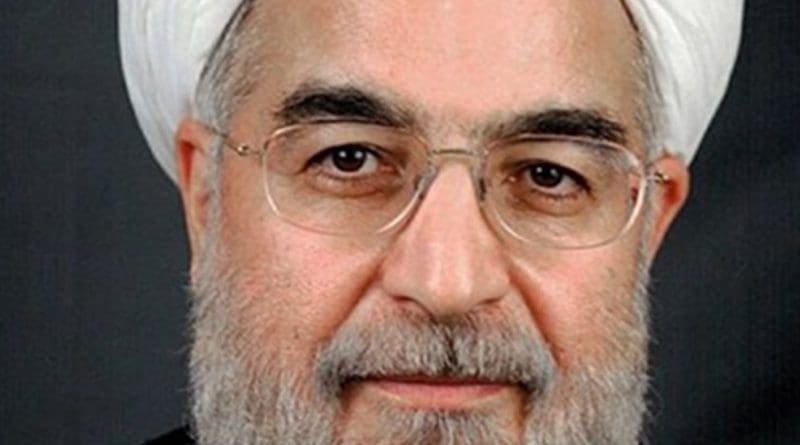Rohani Hails Implementation Of Nuclear Deal And ‘Golden Page’ In Iran’s History
By Arab News
Iranian President Hassan Rohani on Sunday hailed the nuclear deal with world powers, implemented late the previous evening, as a “golden page” in the country’s history, and looked forward to an economic future less dependent on oil.
Iran emerged from years of economic isolation on Saturday when world powers lifted crippling sanctions after confirming that Tehran had curbed its nuclear program as part of a deal agreed last year.
“The nuclear deal is an opportunity that we should use to develop the country, improve the welfare of the nation, and create stability and security in the region,” Rohani said as he presented a draft budget for the next fiscal year to parliament.
Speaking before the parliament in comments broadcast live on state television, Rohani said, “In (implementing) the deal, all are happy except Zionists, warmongers, sowers of discord among Islamic nations and extremists in the US, the rest are happy.”
Rohani said the deal has “opened new windows for engagement with the world.”
A strong supporter of the agreement, Rohani sent out a celebratory tweet calling it a “glorious victory” late Saturday night while the speeches in Vienna were still taking place.
Rohani also said the deal was a win for all negotiating parties and all factions inside Iran. “Nobody has been defeated in the deal neither inside the country nor the countries that were negotiating with us,” he said, referring to the United States, Britain, France, Russia, China and Germany.
Israeli Prime Minister Benjamin Netanyahu, meanwhile, maintained his strong opposition to the deal. Speaking at his weekly Cabinet meeting, he said, “The Israel policy remains as it was — not to allow Iran to acquire a nuclear weapon.”
Netanyahu was a strong public opponent of the negotiations and drew the ire of the Obama administration last year by speaking in front of the US Congress in an attempt to prevent the agreement. On Sunday he repeated his contention that the deal will strengthen and embolden Tehran, leading to greater regional instability.
“What is clear is that Iran will now have more resources to dedicate to their terrorism and aggression in the region and in the world, and Israel is prepared to deal with any threat,” he said.
Rohani said Iran should use the expected influx of money and investments to spark the “economic mutation” of the country, creating jobs and enhancing quality-of-life for Iranian citizens. Iran has been suffering double-digit inflation and unemployment rates for years.
He also said Iran now needs political tranquility to best benefit from the new economic reality. “All should prevent any domestic and foreign trivialities that thwart us,” he said. “Any irrelevant and diverting dispute is against national expedience.”
Rohani said his country needs up to $50 billion in foreign investment per year to reach its goal of eight-percent annual growth.
For Iran, long out in the economic cold over its contested atomic program, implementing the nuclear deal will be a welcome thaw.
More than $30 billion in assets overseas will become immediately available to the Islamic Republic. Official Iranian reports have set the total amount of frozen Iranian assets overseas at $100 billion.
A European oil embargo on Iran will end. Already, some 38 million barrels of oil are in Iran’s floating reserves, ready to enter the market, according to the International Energy Agency.
Celebrations in Tehran were relatively muted at first, because the Vienna implementation announcement came well after midnight. But on Sunday, many Tehran residents expressed optimism about Iran’s future economic prospects.
“Unbelievable! This is a day without sanction after years,” said taxi driver Reza Khoei. “I lost my technical job in a petrochemical complex in south of Iran because of the damn sanctions.”
Fahimeh Lotfi, a housewife and mother of two, said, “I am very happy. Now we are like other countries. No more will we to go to bed every night while worrying about the worsening situation. Bravo Rohani!“
Hassan Dehghani, a 26-year-old street sweeper, said “I hope this helps the municipality to pay my salary on time. Sometimes they pay us with months of delay.”
But not everyone was enthused about the agreement, which limits Iran’s nuclear program in exchange for the lifting of sanctions. The deal is designed with so-called “snap-back” elements that can quickly restore sanctions if Iran is judged to be in violation of its obligations.
Tehran resident Hossein Barati angrily asked, “If America restores the sanctions, can Iran restore its nuclear program? No it can’t! They dismantled all the centrifuges. How many years will it take Iran to restore its program?“
Tehran newspapers largely welcomed the implementation of the deal.
The state-owned IRAN daily wrote on its front-page, “The collapse of sanctions.” The pro-reform Shargh daily, allocated part of its front page to pictures of Foreign Minister Mohammad Javad Zarif and European Union foreign policy chief Federica Mogherini with the headline: “Now, without sanctions.”
Even the hard-line Kayhan daily remained impartial and said, “It is the time of implementation of promises,” by the West.

